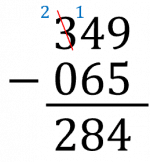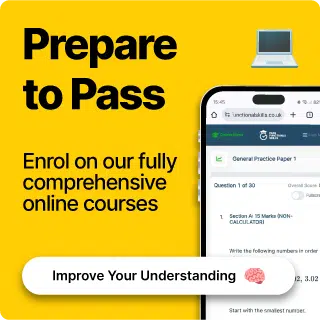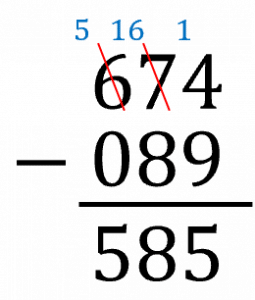Functional Skills: Money
Money
Usually questions combine other skills you have learnt, with money to give them a real life context.
Make sure you are happy with the following topics before continuing.
Units – (Pounds and Pence)
Questions involving money will usually use the units pounds (£) and pence (p).
Switching between these units is key when answering questions that involve money.
\boldsymbol{£1=100}p
So,
To convert pence (p) into pounds (£), divide by 100
To convert pounds (£) into pence (p), multiply by 100
Rounding
Often you are asked to round amounts of money.
Rounding to the nearest pound (£):
- Look at the digits after the decimal point – the amount of pence
- If it is 50p or more round up to the pound above – e.g. £9.59 rounds to £10
- If it is less than 50p, round down to the pound below – e.g. £5.17 rounds to £5
Rounding to the nearest 10p:
- Look at the last digit after the decimal point (the final pence digit)
- If it is 5p or more, round up to the next 10p – e.g. 58p rounds to 60p
- If it is less than 5p, round down to the previous 10p – e.g. 32p rounds to 30p
You can use rounded amounts of money to estimate calculations without a calculator. All you need to do is round each value in the calculation in the same way and then perform the calculation with these rounded values.
Follow Our Socials
Our Facebook page can put you in touch with other students of your course for revision and community support. Alternatively, you can find us on Instagram or TikTok where we're always sharing revision tips for all our courses.
Money Calculations
You will be required to use the skills you learnt in addition and subtraction, multiplication and division to solve problems involving money.
If it is permitted in this part of the exam, you can use a calculator for questions that involve money. The key thing to remember when calculating with money on a calculator is to remember to type the decimal point.
Note: You do the same methods for adding, subtracting, multiplying or dividing whole numbers for money calculation questions!
Example 1: Converting Units – (Pounds and Pence)
Bridie is buying stationary for school. She buys some pens for \boldsymbol{£2.60}, some pencils for \boldsymbol{90}p and a rubber for \boldsymbol{45}p. How much did she spend in total?
[2 marks]
First, change the price of the pencils and the rubber into pounds.
90p =£0.90
45p =£0.45
Now, all the units are the same we can calculate the total cost of the stationary:
£2.60+£0.90+£0.45=£3.95
So, Bridie spent £3.95
Example 2: Money Calculations Without a Calculator
Kelsie wants to buy a new sofa. She is going to sell her old one for £65 and then buy a new one for £349.
What is the price difference between the two sofas?
[2 marks]
To find the price difference you will need to subtract the price of her old sofa from the price of the new one.
The best method for this is the subtraction column method:

Therefore, there is a £284 difference between the two sofas.
Example 3: Money Calculations With a Calculator
Kyra is buying the ingredients for her sister’s birthday cake. Here is what she bought:
- Flour – £0.60
- Sugar – £0.55
- Half a dozen eggs – £0.79
- Icing Sugar – £1.10
- Jam – £1.25
Work out how much she spent.
[2 marks]

So, she spent £4.29
Example 4: Rounding
a) Caleb buys a book for £8.89. How much is the book to the nearest pound?
b) Katie buys a chocolate bar with her pocket money at the corner shop, it costs 64p. How much is the price of the chocolate bar to the nearest \boldsymbol{10}p?
[2 marks]
a) We can see that the pence in the value of the book is 89p.
89p is more than 50p, so round up to the next pound.
Therefore, the book costs £9 to the nearest pound.
b) The last digit of 64 is 4, which is less than 5.
This means we round down to the 10p below, so the chocolate bar costs 60p to the nearest 10p.
Example 5: Estimating
Isabella buys a hat for £11.09, a scarf for £8.98 and a pair of shoes for £24.75. Estimate how much she spent in total.
[2 marks]
For this example we are going to round each value to the nearest pound.
£11.09 rounds to £11 to the nearest pound.
£8.98 rounds to £9 to the nearest pound.
£24.75 rounds to £25 to the nearest pound.
So an estimate for the total amount she spent would be:
£11+£9+£25=\boldsymbol{£45}
Functional Skills: Money Example Questions
Question 1: Ava is buying some chocolate and sweets for her and some friends before they go to the cinema.
She buys 2 chocolate bars for 85p each, a large bag of sweets for £1.40 and 2 small bags of sweets for 55p each.
Work out how much she spends in total.
[3 marks]
First convert the values that are given in pence to pounds:
85p =£0.85
55p =£0.55
2 chocolate bars =2\times£0.85=£1.70
2 small bags of sweets =2\times£0.55=£1.10
Finally, add these values together (including the large bag of sweets):
£1.70+£1.40+£1.10=£4.20
Question 2: Ethan wants to buy a new laptop that costs £674. He has some store credit worth £89.
Without using a calculator, work out how much Ethan pays for the laptop.
[2 marks]
To work out how much he pays, subtract £89 from £674
To do this without a calculator we are going to need to use the column method.
So, the amount Ethan is going to spend is £585
Question 3: Elijah buys the following items from the supermarket:
- Apples – £1.29
- Sausages – £3.45
- Cornflakes – £1.84
- Paracetamol – £0.40
Use a calculator to work out how much he spends.
[2 marks]
Adding these values on a calculator:
1.29+3.45+1.84+0.40=6.98
So, Elijah spends £6.98
Question 4:
a) Round the following amounts to the nearest pound:
i) £13.44
ii) £20.86
b) Round the following amounts to the nearest 10p:
i) £16.67
ii) £8.91
[4 marks]
a)
i) £13.44 rounds down to £13 to the nearest pound.
ii) £20.86 rounds up to £21 to the nearest pound.
b)
i) £16.67 rounds up to £16.70 to the nearest 10p.
ii) £8.91 rounds down to £8.90 to the nearest 10p.
Question 5: Olivia buys three books for: £7.87, £9.05 and £4.08
Estimate how much she spent in total.
[2 marks]
Rounding each value to the nearest pound:
£7.87 rounds to £8
£9.05 rounds to £9
£4.08 rounds to £4
Adding these rounded values together:
£8+£9+£4=£21
Specification Points Covered
EL3.10 – Calculate with money using decimal notation and express money correctly in writing in pounds and pence
EL3.11 – Round amounts of money to the nearest £1 or 10p








